
Kurds or Kurdish people are an Iranian ethnic group native to the mountainous region of Kurdistan in Western Asia, which spans southeastern Turkey, northwestern Iran, northern Iraq, and northern Syria. There are exclaves of Kurds in Central Anatolia, Khorasan, and the Caucasus, as well as significant Kurdish diaspora communities in the cities of western Turkey and Western Europe. The Kurdish population is estimated to be between 30 and 45 million.

Sulaymaniyah, also called Slemani, is a city in the east of the Kurdistan Region of Iraq, not far from the Iran–Iraq border. It is surrounded by the Azmar, Goizha and Qaiwan Mountains in the northeast, Baranan Mountain in the south and the Tasluja Hills in the west. The city has a semi-arid climate with very hot dry summers and cold wet winters.

The Cinema of Iran, also known as the Cinema of Persia, refers to the cinema and film industries in Iran which produce a variety of commercial films annually. Iranian art films have garnered international fame and now enjoy a global following. Iranian films are usually written and spoken in the Persian language. Iranian cinema has had many ups and downs.

Turtles Can Fly is a 2004 Kurdish war drama film written, produced, and directed by Bahman Ghobadi. The film stars Soran Ebrahim, Avaz Latif, Saddam Hossein Faysal, Hiresh Feysal Rahman, Abdolrahman Karim, Ajil Zibari. The plot is about three refugee children, on the border of Iraq-Turkey, awaiting for the Americans to invade Iraq and the fall of Saddam Hussein.
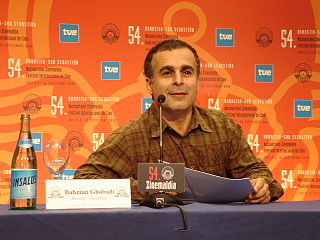
Bahman Ghobadi is an Iranian-Kurdish film director, producer and writer. He belongs to the "new wave" of Iranian cinema.
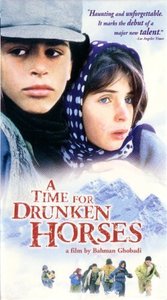
A Time for Drunken Horses is a 2000 Kurdish language film directed by Bahman Ghobadi and produced in Iran. It was a co-winner of the Caméra d'Or award at the Cannes Film Festival in 2000. Leonard Maltin notes that the film was "written by the director and shot in his native village, with a cast of extraordinary non-professionals."
Jamil Rostami is a Kurdish film director
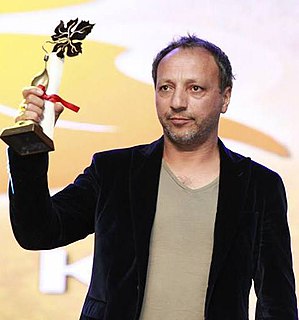
Huner Saleem, also transliterated as Huner Salim,, is an Iraqi–Kurdish film director. He was born in the town of Aqrah (Akre) in Iraqi Kurdistan. He left Iraq at the age of 17, and soon made his way to Italy, where he completed school and attended university. Later on, he moved to France where he lives now. In 1992, after the First Gulf War, he filmed undercover the living conditions of Iraqi Kurds. This footage was shown at the Venice Film Festival. In 1998, he made his first movie, Vive la mariée... et la libération du Kurdistan. His second, Passeurs de rêves, came out in 2000, and his third film, Vodka Lemon, released in 2003, won the San Marco Prize at the Venice Film Festival. He wrote and directed all three. He was honored with the prestigious title Chevalier des Arts et Lettres by French Minister of Culture Renaud Donnedieu de Vabres in 2005. His memoirs titled My Father's Rifle has been published in French, English, Greek and Tamil.
Kurdish cinema focuses on the Kurdish people and culture. The fate of the Kurds as a people without a state shaped their cinema. Kurdish movies often show social grievances, oppression, torture, human rights violations, and life as a stranger. Kurdish cinema has a high significance for the Kurds, as it offers the opportunity to draw attention to their own situation artistically. However, because of state repression, most films are produced in exile. The best example of this is in Turkey, where Kurds were not permitted to speak their native language until 1991, which made the development of their films more difficult.
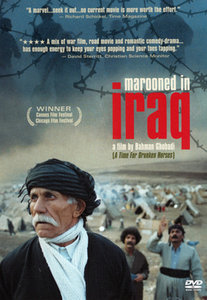
Marooned in Iraq is a 2002 Iranian (Kurdish/Persian) film directed by Bahman Ghobadi and produced in Iran. It was screened in the Un Certain Regard section at the 2002 Cannes Film Festival.
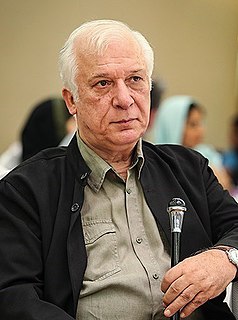
Khosrow Sinai was an Iranian film director, screenwriter, composer, poet and scholar.

Half Moon is a 2006 an internationally co-produced Kurdish comedy-drama film directed by Bahman Ghobadi, who co-wrote the screenplay with Behnam Behzadi, partly inspired by Wolfgang Amadeus Mozart's Requiem. The film stars Ismail Ghaffari as Mamo, an old legendary musician, who sets to trespass the borders of Iranian Kurdistan to give one final concert in Iraqi Kurdistan with his 10 sons.
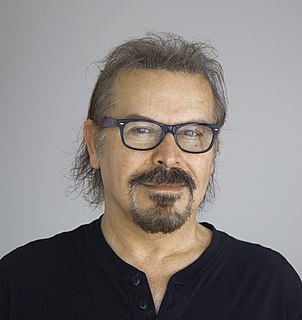
Jano Rosebiani is an Iraqi-Kurdish American filmmaker. He is the winner of numerous international awards and has been listed in the top 35 world filmmakers in the book "Cineaste Uit De Schaduw" by Belgian celebrity photographer Kris De Witte.
Granaz Moussavi , is an Iranian-Australian contemporary poet, film director and screenwriter. She is primarily renowned for her avant-garde poetry in the 90s. Her award-winning debut feature film My Tehran for Sale is an internationally acclaimed Australian-Iranian co-production.

Shahram Alidi is an Iranian film director, screenwriter, and film producer. He is also a painter, illustrator, and graphic designer. Alidi is part of a generation of filmmakers in the Iranian New Wave. These filmmakers share many common techniques including the use of poetic dialogue
and allegorical story telling. His credits include the 2009 film Whisper with the wind.
The Duhok International Film Festival is an annual film festival held in Duhok, Kurdistan Region. Each year Duhok IFF presents new and exciting cinema from the Kurdish Cinema and beyond. The 8th edition was held from November 11 to 18, 2021 which focused on Afghanistan.
Mehmet Aktaş is a Kurdish filmmaker, producer, author and journalist born in Turkey but living in Germany. He is founder and chief executive of the film production and distribution company Mîtosfilm in Berlin.

Reza Farahmand is an Iranian film director, most known for documentary films.

Narges Abyar is an Iranian film director, author and screenwriter, best known for directing Track 143, Breath, and When the Moon Was Full. The film Track 143 is adapted from Abyar's novel titled The Third Eye narrating the story of a woman and her son during the time of war. Her films sensitively picture the sufferings of women and children caused by the society, war or radicalism.

The International Kurdish Theater Festival is the most important theater festival in the Kurdish regions of Iran, Rojhalat, which has been held in Saqqez city, since December 1999, with the participation of professional theater groups from different parts of Iran and abroad. So far, 16 periods of this festival have been held, the last of which was on December 19–22, 2019. This festival is organized by the Ministry of Culture and Islamic Guidance of Iran.















